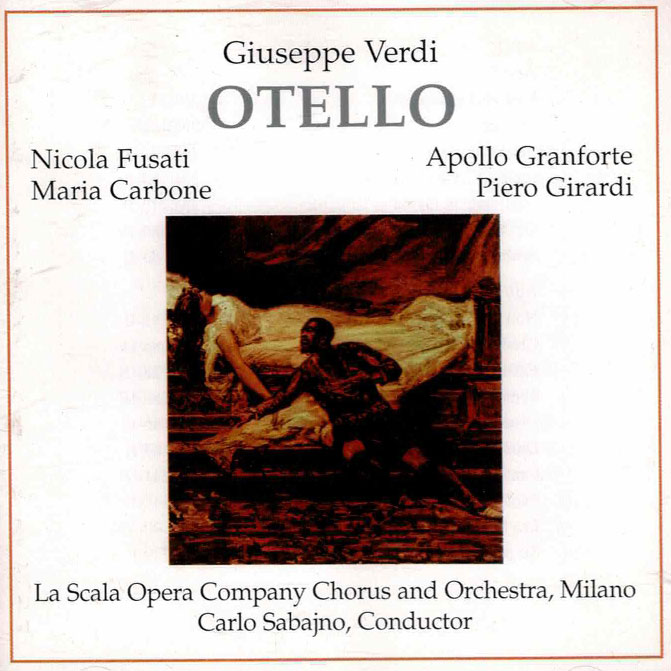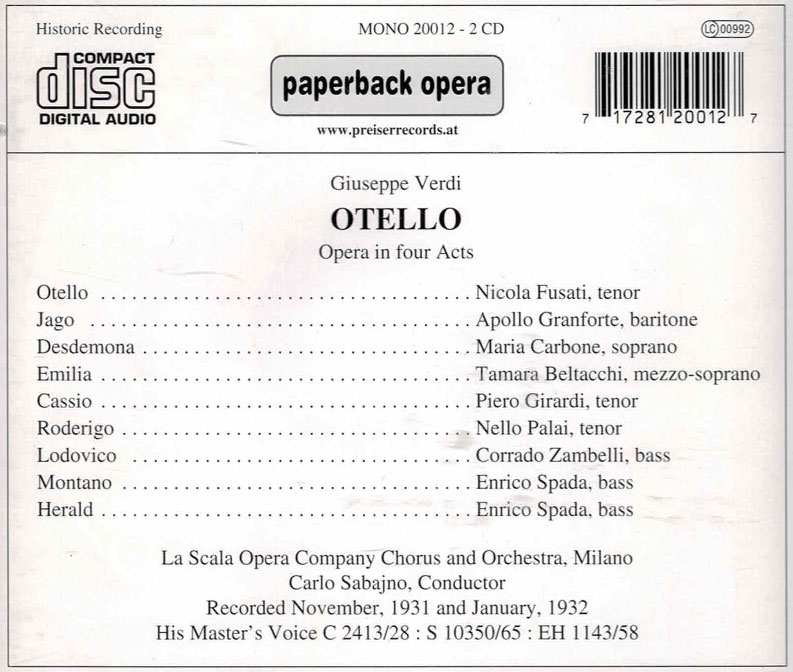Logowanie
Dziś nikt już tak genialnie nie jazzuje!
Bobby Hutcherson, Joe Sample
San Francisco
SHM-CD/SACD - NOWY FORMAT - DŻWIĘK TAK CZYSTY, JAK Z CZASU WIELKIEGO WYBUCHU!
Wayne Shorter, Freddie Hubbard, Herbie Hancock, Ron Carter, Elvin Jones
Speak no evil
UHQCD - dotknij Oryginału - MQA (Master Quality Authenticated)
Chesky! Niezmiennie perfekcyjny
Winylowy niezbędnik
ClearAudio
Double Matrix Professional - Sonic
najbardziej inteligentna i skuteczna pralka do płyt winylowych wszelkiego typu - całkowicie automatyczna
VERDI, Nello Palai, Tamara Beltacchi, Piero Girardi , Carlo Sabajno, Orchestra e Coro della Scala di Milano
Otello - 1931/1932

- Nello Palai, Tamara Beltacchi, Piero Girardi
- Carlo Sabajno - conductor
- Orchestra e Coro della Scala di Milano - orchestra
- VERDI
Lebendige Vergangenheit
Mit der Aufnahme der Oper „Otello“ beendete der Hausdirigent Carlo Sabajno seine Tätigkeit für „His Master’s Voice“. Es war dies seine 24. Opern-Gesamtaufnahme, wenn man die zwölf akustischen von 1915 bis 1921 dazu zählt. Auch Apollo Granforte, der grandiose Bariton, verabschiedete sich mit der Verkörperung des Jago vom Medium Schallplatte. Maria Carbone, die Interpretin der Desdemona, hatte bereits 1930 in einer Gesamtaufnahme der Oper „Carmen“ die Micaela gesungen, zu weiteren Aufnahmen kam es jedoch nicht. Auch von Nicola Fusati, (1876 – 1956), existieren nach dieser Gesamtaufnahme keine weiteren Tondokumente. So besehen könnte man diese Aufnahme als Abschluss einer Ära bezeichnen, denn mit der Produktion der ersten Gigli-Gesamtaufnahme der Oper „I Pagliacci“ im Juli 1934 begann ein neuer Abschnitt in der Geschichte der Schallplatte. For conductor Carlo Sabajno this „Otello“ was his last recording for „His Master’s Voice“. It was his 24th complete opera recording if one also takes into account the twelve acoustic recordings made between 1915 and 1921. For the great baritone, Apollo Granforte, too, this recording represented his farewell to the recording studio. Soprano, Maria Carbone, the Desdemona in this recording, had already taken part in the complete „Carmen“ recording in 1930, where she sang Micaela, but no further recordings were made with her. Not even the singer of the title role, tenor Nicola Fusati (1876-1956) continued to record after this „Otello“. Thus, this production marks the end of an era. With the first complete operatic recording featuring Beniamino Gigli, „I Pagliacci“ in July 1934, a new period in recording history was started Nello Palai (ténor) Tamara Beltacchi (mezzo-soprano) Piero Girardi (ténor) Maria Carbone (soprano) Enrico Spada (basse) Apollo Granforte (baryton) Corrado Zambelli (basse) Nicola Fusati (ténor) Chœur du Théâtre de la Scala de Milan Orchestre du Théâtre de la Scala de Milan Carlo Sabajno


































